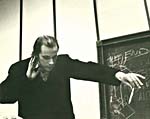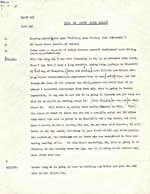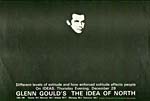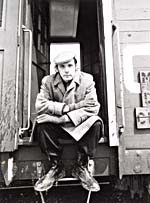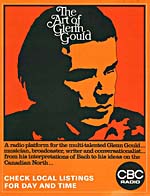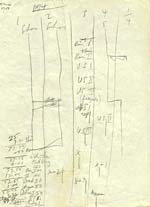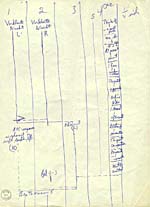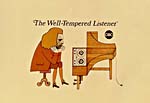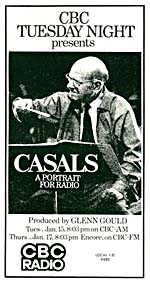Common menu bar links
Institutional links

ARCHIVED - The Glenn Gould Archive
Archived Content
This archived Web page remains online for reference, research or recordkeeping purposes. This page will not be altered or updated. Web pages that are archived on the Internet are not subject to the Government of Canada Web Standards. As per the Communications Policy of the Government of Canada, you can request alternate formats of this page on the Contact Us page.
Glenn Gould
Later Career
Documentaries (Part 1 of 2)
In the 1960s Gould began to take a strong and active interest in radio and TV documentaries, nearly all for the CBC. He was the deviser, compiler, interviewer, writer, narrator and even producer of many of these programs, which ranged in subject matter from contemporary music to Newfoundland, from Stokowski to the Mennonites. He approached the technique of the documentary as a composer might approach the fugue or sonata movement form, or even an opera. Weaving together spoken voices and background sounds in counterpoint to each other, Gould achieved highly inventive and original effects.
In Gould's youth, "going north" had meant a trip to the family cottage on the shore of Lake Simcoe, a mere 150 kilometres from Toronto. As an adult he would venture further north to Algoma and beyond. During the 1960s he took a train to Churchill, Manitoba, recording many of the sounds he heard during the journey for a radio documentary.
The North was, for Gould, a moral concept as well as an excursion to frozen wastelands. It meant an exploration of the unknown, a quest for serenity and peace. The Idea of North was the first in a trilogy of documentaries dealing with people outside the mainstream, people for whom apartness and solitude are sources of spiritual strength. The Idea of North held a particular appeal for Gould with its implications of solitude, winter darkness and cold weather, all of which he associated with purity.
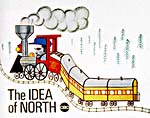
Promotional artwork from the CBC television version of The Idea of North. Produced by Judith Pearlman and broadcast August 5, 1970
Diagram of music excerpts for contrapuntal radio project, manuscript, ca 1970

